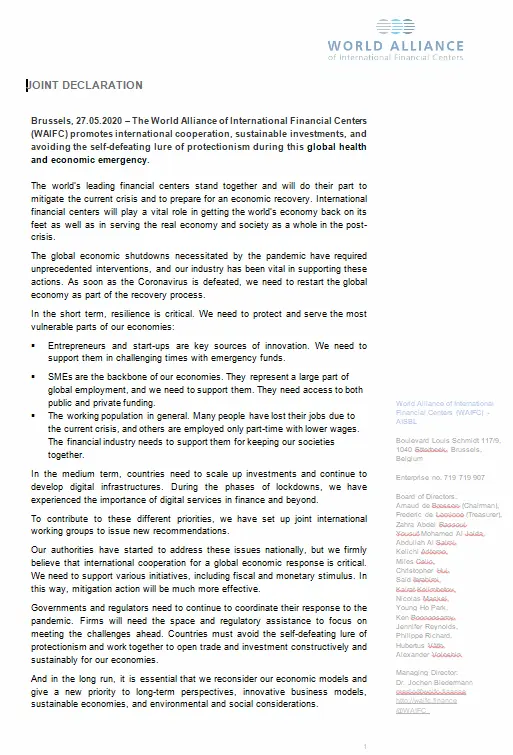
Gemeinsame Erklärung zur aktuellen Pandemie
GEMEINSAME ERKLÄRUNG
Die führenden Finanzzentren der Welt stehen zusammen und werden ihren Teil dazu beitragen, die gegenwärtige Krise abzuschwächen und sich auf eine wirtschaftliche Erholung vorzubereiten. Die internationalen Finanzzentren werden eine entscheidende Rolle dabei spielen, die Weltwirtschaft wieder auf die Beine zu bringen. Unsere Organisation ist sich der wichtigen Rolle bewusst, die der Finanzsektor im Dienste der Realwirtschaft und der Gesellschaft als Ganzes spielt.
Der durch die Pandemie verursachte weltweite wirtschaftliche Shutdown hat beispiellose Interventionen erforderlich gemacht, und unsere Industrie hat diese Maßnahmen entscheidend unterstützt. Sobald wir das Coronavirus im Schach halten können, müssen wir die Weltwirtschaft als Teil des Erholungsprozesses wieder in Gang bringen.
Kurzfristig ist die ökonomische Widerstandsfähigkeit von entscheidender Bedeutung. Wir müssen die schwächsten Teile unserer Volkswirtschaften schützen und sie unterstützen:
- Unternehmer und Start-ups (nicht nur in der Finanzindustrie) sind die Hauptquellen für Innovationen. Wir müssen sie in schwierigen Zeiten mit Notfallfonds unterstützen.
- Mittelständische Unternehmen sind das Rückgrat unserer Volkswirtschaften. Sie machen einen großen Teil der weltweiten Beschäftigung aus, und wir müssen sie unterstützen. Sie brauchen Zugang zu öffentlicher und privater Finanzierung.
- Viele Menschen haben aufgrund der gegenwärtigen Krise ihren Arbeitsplatz verloren, und andere sind in Kurzarbeit mit niedrigeren Löhnen beschäftigt. Wir müssen auch sie nach Kräften unterstützen, um unsere Gesellschaften zusammenzuhalten.
Mittelfristig müssen die Länder ihre Investitionen aufstocken und die Entwicklung digitaler Infrastrukturen fortsetzen. In den Phasen der Abschottung haben wir die Wichtigkeit der digitalen Angebote im Finanzbereich und darüber hinaus gesehen.
Um zu diesen verschiedenen Prioritäten beizutragen, haben wir gemeinsame internationale Arbeitsgruppen eingerichtet, die neue Empfehlungen aussprechen sollen.
Unsere Behörden haben damit begonnen, diese Fragen auf nationaler Ebene anzugehen, aber wir sind fest davon überzeugt, dass die internationale Zusammenarbeit für eine globale wirtschaftliche Antwort entscheidend ist. Wir müssen verschiedene Initiativen unterstützen, einschließlich steuerlicher und monetärer Anreize. Auf diese Weise werden die Maßnahmen viel wirksamer sein.
Regierungen und Regulierungsbehörden müssen ihre Reaktion auf die Pandemie weiterhin koordinieren. Unternehmen werden den Raum und die regulatorische Unterstützung benötigen, um sich auf die Bewältigung der vor ihnen liegenden Herausforderungen konzentrieren zu können. Die Länder müssen die selbstzerstörerische Verlockung des Protektionismus vermeiden und zusammenarbeiten, um Handel und Investitionen konstruktiv und nachhaltig für unsere Volkswirtschaften zu öffnen.
Langfristig ist es unerlässlich, dass wir unsere Wirtschaftsmodelle überdenken und langfristigen Perspektiven, innovativen Geschäftsmodellen, nachhaltigen Wirtschaften sowie ökologischen und sozialen Aspekten Priorität einräumen.
Arnaud de Bresson, Vorsitzender des Vorstands der WAIFC und CEO von Paris Europlace:
“This crisis will change the business model for the coming years. New priorities are to accelerate solidarity, as well as the development of innovation. The financial industry is part of the solution to accompany the financing of corporates, as well as to develop sustainable finance and the development of new technologies. With WAIFC, International financial centers are accelerating their cooperation to fix new objectives and share their best practices.”
Miles Celic, Mitglied des Vorstands der WAIFC und CEO von TheCityUK:
“COVID-19 is a global health emergency but also a global economic emergency. Unprecedented international challenges need international coordination so that we can maximize the effectiveness of steps that individual jurisdictions are taking. International financial centers have been at the heart of meeting the immediate economic consequences. We will also be central to the recovery. Governments must work ever more closely with each other and with industry to help make this possible.”
Kairat Kelimbetov, Mitglied des Vorstands der WAIFC und Governeur des Astana International Financial Centre:
“We face a new reality, but one that the international financial community, and the AIFC that I lead, are well prepared to respond to; advising and supporting the governmental response, providing and delivering the tools and investment to restart the economy and to help those businesses most in need, especially the SMEs. Cooperation on trade and investment, sharing best practices, and empowering those with applicable skills will be key to rebuilding national and global economic wellbeing.”
Keiichi Aritomo, Mitglied des Vorstands der WAIFC und geschäftsführender Direktor FinCity.Tokyo:
“Although COVID-19 is a global pandemic, political reactions have been somewhat disjointed and fragmented across the jurisdictions. In this circumstance, WAIFC is uniquely positioned to seamlessly and positively influence various government stakeholders to drive the economic turnaround in a harmonized manner. Although COVID-19 is a huge tragedy, we are observing a few positive outcomes from this experience. From Tokyo’s perspective, we are rapidly transforming the entire financial ecosystem and supply chains resulting in a significant productive enhancement. For example, white-collar professionals are finally embracing digital communications and cloud computing tools. Robotics and IoT are increasingly employed in manufacturing, agricultural, and services industries across Japan’s regional areas. FinCity.Tokyo is acting as a catalyst for post-coronavirus new normal.”
Jennifer Reynolds, Mitglied des Vorstands der WAIFC, Präsident& CEO von Toronto Finance International:
“The financial sector has been working in close collaboration with governments and regulators to act quickly to ensure access to credit and financial stability for individuals and businesses. Continued collaboration and coordination with the financial sector will be critical to the successful recovery from the economic and social impacts of this global pandemic.”
Nicolas Mackel, Mitglied des Vorstands der WAIFC und CEO von Luxembourg for Finance:
“As the world slowly starts to lift containment measures, the financial services industry will play a pivotal role in the recovery from the COVID-19 pandemic’s economic consequences. Financial institutions, such as banks but also asset managers and insurance companies, are supporting industries as well as SMEs by providing them the necessary finances. Financial centers help through the expertise that is clustered in them to process these flows more efficiently.”
Yousuf Mohamed Al-Jaida, Mitglied des Vorstands der WAIFC und CEO des Qatar Financial Centre:
“Preparing for the aftermath of the COVID-19 pandemic is as equally important to the strict containment measures. In this course of action, trade is an integral component of global economic recovery, and governments, working with organizations such as WAIFC, must start building economic infrastructure that supports steady and inclusive recovery.”
Saïd Ibrahimi, Mitglied des Vorstands der WAIFC und CEO der Casablanca Finance City:
“In Africa, the post-COVID-19 offers a unique opportunity to catalyze structural reforms, diversify the economies, strengthen the value chains, and foster further sustainable and inclusive growth pathways. We have the strong conviction that financial centers will play an instrumental role in channeling investments where they are the most needed.”
H.E. Abdullah Al Salmi, Mitglied des Vorstands der WAIFC und geschäftsführender Präsident der Capital Market Authority Oman:
“There is no doubt that COVID-19 has had its toll on financial markets around the world. But, also, there should not be any doubt that this crisis institutes an opportunity for financial centers to work more closely than ever before to help a rapid and comprehensive recovery.”
Young Ho Park, Mitglied des Vorstands der WAIFC und Leiter des BIFC Promotion Center:
“As we overcame infectious diseases in the past, we believe humankind will eventually win this battle. As always, the crisis will soon be an opportunity, and our financial services industry will be able to take advantage of the crisis as an opportunity to embrace new technologies and achieve business advancement. And we hope that the social role of finance will be highlighted through the spread of social finance, which will serve as an opportunity to expand the scope of the financial industry.”
Alexander Voloshin, Mitglied des Vorstands der WAIFC und Vorsitzender des Forum Analytical Center, Moskau:
“We have yet to discover the full extent of COVID-19 related global economic crisis. One thing is certain: unlike other past crises, this one was not caused by the financial sector. If anything, the financial sector was prepared to take it on. Today, our industry is part of the solution. We must rise up to the circumstances.
Members of the Alliance and other states have launched a wide range of SME aid, as well as social relief policies. The financial sector is focused on making the tax burden easier for businesses and individuals. We aim to offer affordable financial products during the crisis. This is the right direction to take.
We are facing a new challenge – finance must remain stable as we work our way out of the pandemic crisis. I strongly believe that expertise in innovative transformation accumulated by the financial industry in recent years will enable us to be more inclusive, adaptive, efficient – for the benefit of our clients and economies.”
Hubertus Väth, Mitglied des Vorstands der WAIFC und Geschäftsführer, Frankfurt Main Finance:
“Financial centers play a key role in safeguarding productive capital and kick-starting economies, as governments first hit and now slowly release the brakes on their efforts to stem the COVID-19 pandemic. The financial industry is certainly a critical piece of the solution. A financial center’s diverse infrastructure, the large pool of professional talents, and established coordination between local and development banks enables governments to implement their strategies for economic recovery.”
Zahra Abdel Rassoul, Mitglied des Vorstands der WAIFC und stellvertretende Geschäftsführerin, Stuttgart Financial:
“We reached the stage where confinement measures just get gradually lifted in our countries; however, can we already tell, that the new normal is not going to be the same as the old normal. The COVID-19 crisis left consequences on a global scale, which makes it essential to process and solve the effects on a global scale as well. The key factors we believe are going to be collaboration, transparency, and trust. The WAIFC has excellent potential to contribute to the solution-finding process as major financial centers collaborate on challenges our financial centers face by sharing best practices, and transparency of successful approaches.”
The World Alliance of International Financial Centers (WAIFC) is a non-profit association registered in Belgium, representing 17 leading international financial centers of four continents. WAIFC members are city governments, associations, and similar institutions developing and promoting their financial centers.
In an era of breakthrough technologies and rapid social change, financial centers are crucial to sustaining economic growth. Thus, the objective of the WAIFC is to create a transparent network that facilitates cooperation and sharing of best practices to further the understanding of the importance of international financial centers for national and global economies as well as social development.
